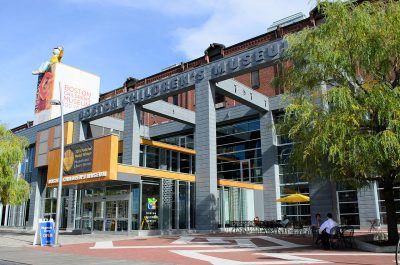Boston Children’s Museum began an in-person April Adventure Week for students K-2 to explore the museum and take part in science, technology, engineering, art and math activities Monday.

The museum is closed for guests while the students attend in groups of 10 with two museum staffers for the week-long program, according to its website. The museum has been closed since December but is scheduled to reopen to the public in May with limited hours.
Participants are required to socially distance and wear a face mask, and caregivers need to fill out a self-certification that their child is in good health.
Keeping the museum closed to the public and ensuring children are supervised by healthy staff means the program may reduce risk during the COVID-19 pandemic, said Paul Beninger, associate professor of public health and community medicine at Tufts University.
“We’re talking about kids, who are otherwise at low risk, being supervised by adults who are in good health,” Beninger said. “I think that’s pretty good.”
Beninger added the risk of infection is lower compared to more crowded events, which usually involve more movement.
“It’s not the social gathering per se, it’s what happens with those gatherings,” he said. “And [if] they’re not wearing a mask, and they get so excited, and there’s screaming, and high-fiving, and elbowing and everything else that goes on … it’s infectious. And I mean, the social contact is infectious, the virus aside.”
Beninger added that the event — while educational — differs from traditional classroom instruction because attendees choose to be there.
“When you’re talking about schools, you’re talking about a whole range of students,” Beninger said, “who are at different stages of social development and different interests of being there for a long period of time.”
The virtual shift has raised concerns about educational loss during the pandemic, and enrichment programs — such as April Adventure Week — have become increasingly important, said Darrell Earnest, associate professor at the University of Massachusetts Amherst’s College of Education.
“Being in person really enables children to get their hands dirty, to be working and actually doing things,” Earnest said. “[It] enables certain possibilities that really are harder to come by in remote settings.”
Events include a “museum takeover,” where children will “guide their own supervised exploration,” along with other STEAM activities.
The Boston Children’s Museum could not be reached for additional comment about the event.
Earnest added that enrichment programs, especially in the science and math fields, also help foster children’s curiosity.
“A part of what programs like this can do is support learning,” he said. “Importantly, it’s not just content, but also sparking curiosity and encouraging children to think more about how the world works and how we can explore it.”
The program’s activities expose students to science instruction they might not have time for in school, said Arthur Eisenkraft, distinguished professor of science education at UMass Boston.
The skills and topics children learn in these programs can also be applied at home with their parents to further youth science education, he added.
“There are ways to integrate science instruction into the aspects of our daily lives,” Eisenkraft said, “and the enrichment programs help parents learn how to do that to support their children at home.”
The Children’s Museum’s program and other community-based programs can improve a child’s ability to socialize, play and develop cognitively in a pre-pandemic world, said Emily Mann, teaching professor of human services at Northeastern University.
“What I like about the play-based programming at the museum … is that they are using play, something that kids are naturally inclined to do, as a way to support social, emotional health, which I think is really critical right now,” Mann said. “So many kids are dealing with the stress and strain from life, and the stress and strain from COVID and the stress and strain from having sort of an inconsistent year.”
In addition to the hands-on STEAM activities, children have the opportunity to make “friends and memories” during April Adventure Week, according to the program’s website.
“Families are trying to sort of figure out what ways to support their children who have been less engaged in school and in their community because of the pandemic,” Mann said. “Finding playful, engaging, affordable programming is key.”


























































































































